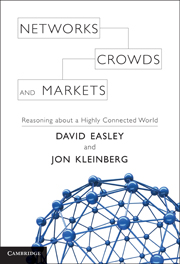Book contents
- Frontmatter
- Contents
- Preface
- 1 Overview
- Part I Graph Theory and Social Networks
- Part II Game Theory
- Part III Markets and Strategic Interaction in Networks
- Part IV Information Networks and the World Wide Web
- Part V Network Dynamics: Population Models
- Part VI Network Dynamics: Structural Models
- Part VII Institutions and Aggregate Behavior
- 22 Markets and Information
- 23 Voting
- 24 Property Rights
- Bibliography
- Index
23 - Voting
from Part VII - Institutions and Aggregate Behavior
Published online by Cambridge University Press: 05 June 2012
- Frontmatter
- Contents
- Preface
- 1 Overview
- Part I Graph Theory and Social Networks
- Part II Game Theory
- Part III Markets and Strategic Interaction in Networks
- Part IV Information Networks and the World Wide Web
- Part V Network Dynamics: Population Models
- Part VI Network Dynamics: Structural Models
- Part VII Institutions and Aggregate Behavior
- 22 Markets and Information
- 23 Voting
- 24 Property Rights
- Bibliography
- Index
Summary
In the previous chapter, we saw a first example of an institution that can synthesize information held by many people, through the ways in which markets serve to aggregate the individual beliefs of investors. We now turn to a second fundamental institution: voting.
Voting for Group Decision Making
Like markets, voting systems also serve to aggregate information across a group, and as a result, it's hard to draw a perfectly clear dividing line between these two kinds of institutions. But there are definite distinctions between the respective settings in which they are typically applied. A first important distinction is that voting is generally used in situations where a group of people is expressly trying to reach a single decision that in a sense will speak for the group. When a population votes on a set of candidates or ballot initiatives, a legislative body votes on whether to pass a bill, a jury votes on a verdict in a trial, a prize committee votes on the recipient of an award, or a group of critics votes on the top movies of the past century, the resulting decision is a single outcome that stands for the group and has some kind of binding effect going forward. In contrast, markets synthesize the opinions of a group more indirectly, as investors' beliefs are conveyed implicitly through their transactions in the market — choosing how much to invest or to bet, choosing whether to buy or not to buy, and so forth.
- Type
- Chapter
- Information
- Networks, Crowds, and MarketsReasoning about a Highly Connected World, pp. 645 - 680Publisher: Cambridge University PressPrint publication year: 2010



